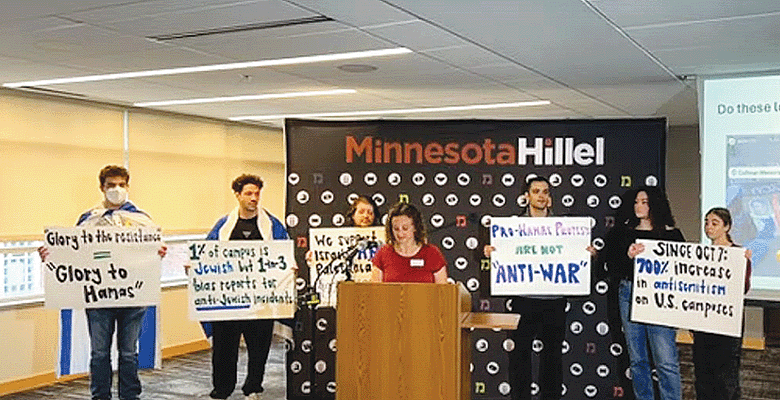By ELANA WARREN / Assistant Editor
In the early morning on Tuesday, April 23, Students for Justice in Palestine, UMN Students for a Democratic Society, UMN Students for Climate Justice and others set up an encampment to protest “the political repression of Palestine activists on campus” and the University of Minnesota’s investment in the Israel-Hamas war.
Campus police cleared the encampment on Northrop Mall — while gathering is allowed, the university requires a permit for tents — and organizers responded with a walkout from Coffman Memorial Union that afternoon and erected more tents outside of the student union.

UMPD arrested nine people at the first encampment: six students along with a staff member, a former student and a community member.
“The group was asked to disperse by 7 a.m. and told they would be arrested if they chose to stay past that time. Some of those present chose to disperse and continue peacefully protesting, but nine chose to remain and were arrested without incident,” the University of Minnesota said in a statement the morning of April 23.
The university released a second statement that evening: “The University of Minnesota supports individual rights to free speech and lawful protest. In fact, as a large public university, demonstrations where groups express diverse views and opinions occur regularly on our campus. The vast majority occur without arrests, which was true about Tuesday night’s protest as well.
“University of Minnesota Police approached an encampment in front of Coffman Memorial Union on the Twin Cities campus shortly after 11 p.m. on Tuesday and communicated that those present were in violation of University policy and state trespassing law. This was a similar warning to the one provided to those who established an encampment earlier in the day on the other end of the Northrop Mall. Those in this evening’s encampment dispersed, and tents and other structures were removed.”
Protests continued on April 24, with a die-in in the student union — people lay on the ground, acting dead, while someone read the names of those killed in Gaza.
Protest organizers demanded the following of the university (per the organizers’ social media pages):
- “Divest from all companies complicit in war crimes and human rights violations.”
- “Ban Lockheed Martin, Honeywell, General Dynamics, and their subsidiaries from campus.”
- “Boycott and cut all ties with militarized Israeli institutions that are currently aiding the ongoing genocide in Gaza.”
- “Disclose all University investments and spending.”
- “Release a statement in support of UMN’s Palestinian student body and recognize the Thawabit [Palestinian principles or red lines]: The right to self determination. Jerusalem as the Capital of Palestine. The right of colonized people to resist against the occupation. The right of Palestinian refugees to return to historic Palestine.”
- “Amnesty for all students, staff and faculty members disciplined or fired in the movement for Palestinian liberation.”
Some Jews have joined the protests, including Rabbi Jessica Rosenberg, of Jewish Voice for Peace, who led a solidarity Passover seder with the protesters outside the student union.
But others, on their way home or to class, go by the protests with discomfort and fear. Minnesota Hillel and the Jewish Community Relations Council of Minnesota and the Dakotas held a press conference on Friday, April 26, which addressed the pro-Palestine protests on campus.
Speakers claimed the language used at the protests and on signs and chalked onto the ground around campus is often antisemitic and pro-terror. An example is the phrase “Glory to the Resistance,” the resistance being Hamas (Hamas is an Arabic acronym translated to Islamic Resistance Movement), which at its creation, in 1988, called for the killing of Jews.
And this has been going on since Oct. 8 — Jews make up just one percent of the undergraduate student population, yet one in three bias complaints filed at the university this year have alleged antisemitic behavior, according to the JCRC.
“When the activists on campuses glorify Oct. 7, I feel pain to see how proud they are that my people were massacred,” Carlie Sachs, a junior, told the press. “Jewish students are not celebrating the destruction in Gaza. There are no smiles on our faces or cheers for the death of Palestinians.”
Students described feeling alienated when their professors bring up the war and ask for discussion — even in unrelated classes, such as junior Isabelle Pizzurro’s art history class. Ethan Fine, a senior, said Israel was discussed in every one of his classes that week. He also noted that professors canceled their classes and encouraged students to attend the protests during the class period instead. The Jewish students called these disruptions to their education.
Lyla Prass, sophomore, said her geography professor went from teaching about South America to teaching that Israel is a genocidal and apartheid state. One of her classmates saw her Hebrew necklace and asked Prass why she was killing her roommate’s cousins.
She told the press, “I never wanted to go back to that class again because I was afraid.”
(Editor’s note: As the May issue of the Jewish World went to press, Tuesday, April 30, encampment protests continued at the University of Minnesota, starting Monday afternoon, the last day of spring classes. A few hours before the protests started, Jeff Ettinger, U of M interim president, invited various student group leaders to meet about the Israel-Hamas war. The university closed surrounding buildings along Northrop Mall on Monday afternoon and Tuesday. Hamline University also was the site of a protest April 29, and St. Olaf College on April 30.)
(American Jewish World, May 2024)



















